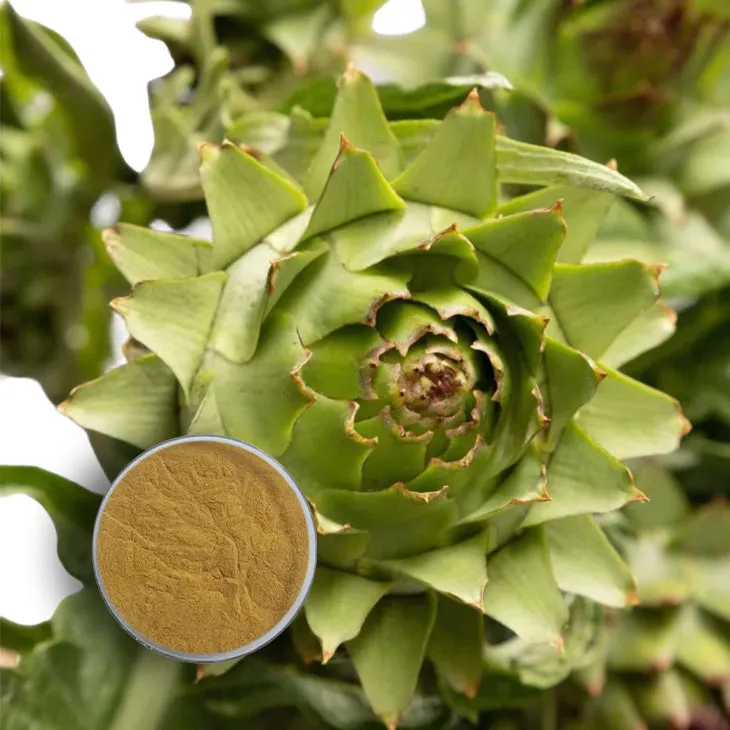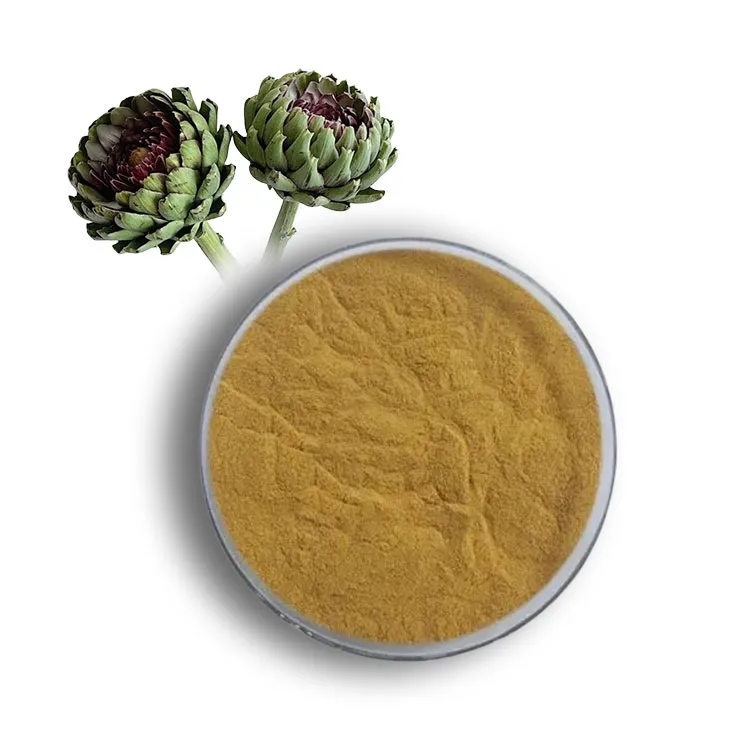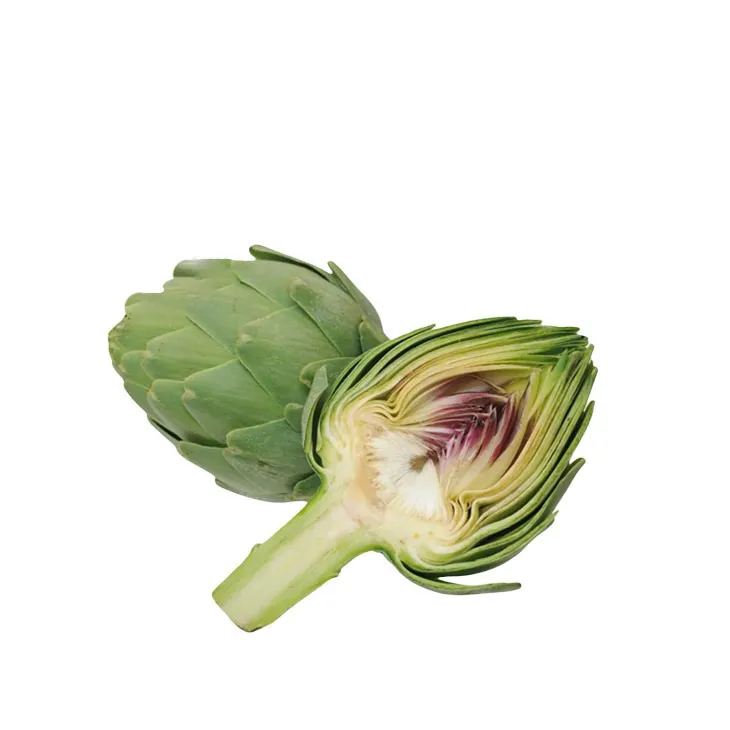- 0086-571-85302990
- sales@greenskybio.com
100% Pure Natural Artichoke Leaf Extract.
2024-11-28

1. Introduction to Artichoke Leaf Extract
Artichoke Leaf Extract is a substance that is directly derived from the artichoke plant, which is a natural wonder. The artichoke, known scientifically as Cynara scolymus, has been used for centuries in various traditional medicine systems. The extract obtained from its leaves is a concentrated form of the beneficial compounds present in the plant.

2. Nutritional Composition
2.1 Antioxidants
One of the key components of Artichoke Leaf Extract is cynarin. This compound is a powerful antioxidant. Antioxidants are crucial as they can counteract the harmful effects of oxidative stress in the body. Oxidative stress occurs when there is an imbalance between the production of free radicals and the body's ability to neutralize them. Free radicals are unstable molecules that can damage cells, proteins, and DNA. Cynarin, present in artichoke leaf extract, helps in scavenging these free radicals, thus protecting the body's cells from oxidative damage.
2.2 Other Compounds
Besides cynarin, artichoke leaf extract also contains other bioactive compounds such as flavonoids. These flavonoids contribute to the overall health - promoting properties of the extract. They may have anti - inflammatory effects and can also play a role in modulating the body's immune response.

3. Benefits for Liver Health
The liver is a vital organ in the body, responsible for numerous functions including detoxification, metabolism, and bile production. Artichoke leaf extract has been the subject of study for its potential positive impact on liver health.
3.1 Bile Production
One of the ways artichoke leaf extract may support liver health is by promoting bile production. Bile is a fluid produced by the liver and stored in the gallbladder. It plays a crucial role in the digestion and absorption of fats. By increasing bile production, artichoke leaf extract can help in the proper breakdown and absorption of dietary fats, which in turn can relieve some of the burden on the liver.
3.2 Liver Detoxification
The liver is constantly exposed to toxins from the environment, food, and medications. Artichoke leaf extract may assist in the liver's detoxification processes. It can potentially enhance the liver's ability to break down and eliminate toxins from the body, thus keeping the liver functioning optimally.

4. Role in Digestion
Artichoke leaf extract can have a significant impact on the digestive system.
4.1 Improving Digestive Process
It helps in improving the overall digestive process. This may be due to its effect on bile production, as mentioned earlier, which is essential for the digestion of fats. Additionally, it can also stimulate the secretion of digestive enzymes in the stomach and intestines, which further aids in the breakdown of food into smaller, more easily absorbable components.
4.2 Relieving Indigestion and Bloating
Many people suffer from indigestion and bloating, which can be uncomfortable and affect the quality of life. Artichoke leaf extract has shown promise in relieving these symptoms. It can help to soothe the digestive tract, reduce inflammation in the gut, and improve the motility of the intestines. This can lead to a reduction in feelings of fullness, bloating, and discomfort after meals.
5. Impact on Cholesterol Levels
Cholesterol management is an important aspect of heart health, and artichoke leaf extract has been studied for its potential role in this area.
5.1 LDL Cholesterol Reduction
Studies have suggested that artichoke leaf extract may help in reducing levels of low - density lipoprotein (LDL) cholesterol, often referred to as "bad" cholesterol. High levels of LDL cholesterol can lead to the build - up of plaque in the arteries, increasing the risk of heart disease. By potentially lowering LDL cholesterol, artichoke leaf extract may contribute to better heart health.
5.2 HDL Cholesterol and Overall Cholesterol Profile
There is also some evidence to suggest that artichoke leaf extract may have a positive impact on high - density lipoprotein (HDL) cholesterol, known as "good" cholesterol. Maintaining a healthy ratio of HDL to LDL cholesterol is important for a healthy cardiovascular system. Additionally, artichoke leaf extract may help in overall cholesterol management by influencing other factors involved in cholesterol metabolism.
6. Purity and Quality
The fact that artichoke leaf extract is 100% pure is of great significance.
6.1 Absence of Synthetic Additives
Since it is pure, consumers can be assured that they are not ingesting any synthetic additives. Synthetic additives are often used in many products to enhance flavor, color, or shelf - life. However, these additives may have potential health risks in some cases. With 100% pure artichoke leaf extract, there are no such concerns related to synthetic additives.
6.2 Freedom from Contaminants
Another advantage of its purity is the freedom from contaminants. Contaminants can include pesticides, heavy metals, or other harmful substances that may be present in plants if they are not grown or processed properly. High - quality artichoke leaf extract is sourced from carefully cultivated artichoke plants and undergoes strict processing and quality control measures to ensure that it is free from contaminants. This means that consumers can enjoy the maximum health benefits without any potential negative impacts from contaminants.
7. How to Incorporate Artichoke Leaf Extract into Your Routine
There are several ways to include artichoke leaf extract in your daily routine.
7.1 Dietary Supplements
One of the most common ways is through dietary supplements. These are available in various forms such as capsules, tablets, or liquid extracts. When choosing a dietary supplement, it is important to look for a high - quality product from a reputable manufacturer. Read the label carefully to ensure that it contains pure artichoke leaf extract without any unnecessary fillers or additives.
7.2 Culinary Uses
Artichokes can also be used in cooking, and by consuming artichoke - based dishes, you can get some of the benefits of the artichoke leaf extract. For example, artichoke hearts can be added to salads, pasta dishes, or used as a topping for pizzas. However, it should be noted that the amount of artichoke leaf extract obtained from culinary sources may be relatively small compared to dietary supplements.
8. Precautions and Considerations
While artichoke leaf extract has many potential health benefits, there are also some precautions to keep in mind.
8.1 Allergies
Some people may be allergic to artichokes. Allergic reactions can range from mild symptoms such as itching and rash to more severe symptoms like difficulty breathing or anaphylaxis. If you have a known allergy to artichokes, it is best to avoid artichoke leaf extract.
8.2 Interaction with Medications
Artichoke leaf extract may interact with certain medications. For example, it may affect the way some drugs are metabolized in the body. If you are taking any medications, especially those for liver or heart conditions, it is important to consult your doctor before starting to take artichoke leaf extract to ensure that there are no potential adverse interactions.
9. Conclusion
Artichoke leaf extract is truly a natural treasure. Its rich nutritional composition, including antioxidants like cynarin, and its potential benefits for liver health, digestion, cholesterol management, and more make it a valuable addition to a healthy lifestyle. The fact that it is 100% pure ensures that consumers can reap the maximum benefits without the worry of synthetic additives or contaminants. However, as with any natural product, it is important to be aware of precautions such as allergies and potential drug interactions. By incorporating artichoke leaf extract into your routine in a safe and informed way, you can potentially enhance your overall health and well - being.
FAQ:
What are the main health benefits of 100% pure artichoke leaf extract?
The main health benefits include combating oxidative stress due to antioxidants like cynarin, supporting liver function by promoting bile production, improving the overall digestive process, relieving indigestion and bloating, and showing promise in managing cholesterol levels which may contribute to heart health.
How does artichoke leaf extract support liver health?
It may support liver health by promoting bile production, which is an important function in the liver's overall role in the body's metabolism and detoxification processes.
Can artichoke leaf extract really relieve indigestion?
Yes, it can. It has properties that can aid in improving the overall digestive process, which in turn can relieve indigestion and bloating.
Is the purity of artichoke leaf extract important?
Yes, its purity is very important. Pure artichoke leaf extract ensures that consumers are getting the maximum benefits without any synthetic additives or contaminants.
How does artichoke leaf extract contribute to heart health?
It has shown potential in managing cholesterol levels. By potentially helping to keep cholesterol in check, it may contribute to heart health as abnormal cholesterol levels are associated with heart disease risks.
Related literature
- The Health - Promoting Properties of Artichoke Leaf Extract"
- "Artichoke Leaf Extract: Composition and Therapeutic Applications"
- "Antioxidant Activity of 100% Pure Artichoke Leaf Extract"
- ▶ Hesperidin
- ▶ citrus bioflavonoids
- ▶ plant extract
- ▶ lycopene
- ▶ Diosmin
- ▶ Grape seed extract
- ▶ Sea buckthorn Juice Powder
- ▶ Beetroot powder
- ▶ Hops Extract
- ▶ Artichoke Extract
- ▶ Reishi mushroom extract
- ▶ Astaxanthin
- ▶ Green Tea Extract
- ▶ Curcumin Extract
- ▶ Horse Chestnut Extract
- ▶ Other Problems
- ▶ Boswellia Serrata Extract
- ▶ Resveratrol Extract
- ▶ Marigold Extract
- ▶ Grape Leaf Extract
- ▶ blog3
- ▶ blog4
-
Mulberry Extract Suppliers.
2024-11-28
-
Active components in aguaje extract.
2024-11-28
-
Standard - process cocoa extract.
2024-11-28
-
Organic Saw Palmetto Extract Powder Factory.
2024-11-28
-
Suppliers of Organic Açai Extract Powder.
2024-11-28
-
Extraction process of black pepper extract.
2024-11-28
-
Wholesale L - Tyrosine Suppliers.
2024-11-28
-
The best milk thistle extract in 2024.
2024-11-28
-
White mustard seed extract
2024-11-28
-
Sea buckthorn Juice Powder
2024-11-28
-
Rosemary extract
2024-11-28
-
Beetroot Powder
2024-11-28
-
Lavender Extract
2024-11-28
-
Purple Sweet Potato Extract
2024-11-28
-
Licorice Root Extract Powder
2024-11-28
-
Lycopene
2024-11-28
-
Rose Hip Extract
2024-11-28
-
Nettle Root Extract
2024-11-28





















